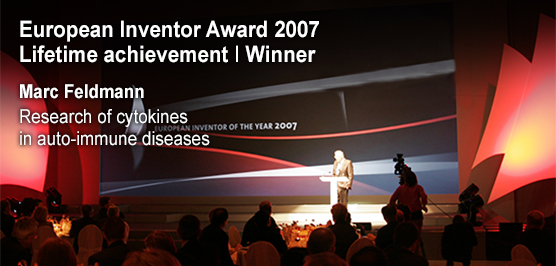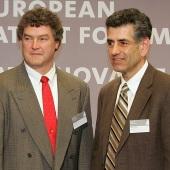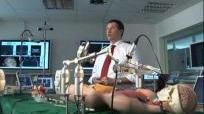Marc Feldmann
Research of cytokines in auto-immune diseases
European Inventor of the Year 2007 in the category "Lifetime achievement"
Scientists were long puzzled by the body's reactions to the effects of autoimmune diseases. What made the body's immune system turn against itself, harming healthy cells while causing inflammation? And in chronic diseases such as rheumatoid arthritis, why were these inflammations so hard to wipe out? Even then, why would inflammations re-emerge throughout the body, like the ever-regenerating heads of that mythical monster, the Hydra?
Finally, a major breakthrough in understanding autoimmune diseases occurred in the early 1990s, when immunologist Marc Feldmann of the Kennedy Institute in London, England, discovered that the key to it all lay in molecules responsible for cell communication - molecules known as cytokines.
Cytokines are normally released by diseased cells for the purpose of alerting the immune system to initiate a counter-response. With autoimmune diseases, Feldmann discovered, highly increased cytokine counts also existed around otherwise healthy cells. This explained the body's aggressive reaction in areas of arthritic inflammation around a patient's joints.
Having identified the enemy, Feldmann and his colleagues began looking for a cure. The idea was as follows: By identifying the molecules that stimulated a pathological immune response - and then blocking these molecules - there was a way to suppress inflammation.
In analysing inflamed tissue from patients with rheumatoid arthritis, Feldmann and his team found that not only one - but in fact several kinds - of cytokines were triggering inflammatory reactions in rheumatoid arthritis.
Leaps and bounds
What was needed was a cure that could kill several birds - or cytokines - with one stone. This goal was almost reached in 1991, when tests in humanoid mice revealed that all the different cytokines could be stopped by blocking one kind - namely Tumor Necrosis Factor (TNF)α.
The laboratory animals were treated with TNFα antibodies, which proved effective in blocking the production of all cytokines involved in inflammation. Antibodies for TNFα (read „T.N.F.-alpha") had emerged as the one-for-all cure that researchers had hoped for.
Adapting the method for use on humans became possible in 1992, when Feldmann conducted the first series of successful trials with rheumatoid arthritis patients at the Kennedy Institute. During the test runs, patients received a TNFα-specific monoclonal antibody known as cA2, later registered as Infliximab. The improvements in health status were so dramatic that even the nurses could identify by mere sight which patients had been given a placebo and which ones had received TNFα blockers.
Feldmann, who is now 62, patented the method in 1995, and his seminal conceptual advances have led to numerous new treatments for rheumatoid arthritis based on the blocking of TNFα in clinical practice. Since then, TNFαinhibitors have become the therapy of choice for stopping the inflammatory and tissue-destructive pathways of rheumatoid arthritis and other autoimmune diseases. As a result, millions of patients have been treated successfully around the world.
Looking back, professor Feldmann says he is glad he chose laboratory medicine over an offer to do a PhD at the Walter and Eliza Hall Institute in Melbourne - an option he had before coming to London as a student. He pursued his route despite opposition from his father, who complained that Feldmann no longer wanted to help patients directly. Feldmann replied that if his research worked he could help thousands instead of only helping patients one by one.
And sure enough, Feldmann's dream would come true.
The scientific community agrees that Professor Feldmann's findings on the role of cytokines in autoimmune disease were nothing short of revolutionary. The now 62-year-old scientist has single-handedly made effective research and specific novel therapeutic treatments possible, a mission which the author of 600 research papers avidly pursues as Head of the Cellular Immunology Department and of the Rheumatology Division of the Kennedy Institute at Imperial College London.
To this day, Feldmann has kept his focus on the real-life applications of his work, to which around 90 patents in his name will attest: "Right now, my work has the long-term intent of helping develop new therapies, so called ‘Translational' research, and so there are close interactions with various pharmaceutical and biotech companies."
How it works
During autoimmune diseases, the human immune system literally turns on itself. Scientists have long since suspected that some kind of signalling molecule that communicates between the cells triggered such a reaction. Cytokines had been a prime suspect, since parallel studies in the early 1980s had suggested that during autoimmune diseases, human leukocyte antigen molecules were present on the cell surface of otherwise healthy cells - making them a target for the immune system.
In the laboratory, Feldmann and his colleagues studied cytokines in human disease tissue obtained from patients of rheumatoid arthritis. The cDNAs of these cytokines cloned from human tissue were then subjected to mRNA analysis. This led to the discovery of TNFα as a major pro-inflammatory cytokine that triggered increased production of the cytokine classified as IL-1. As a logical consequence, Feldmann aimed his research at finding a "master regulator" for TNFα, a so-called TNFα -dependent cytokine cascade.
In treating TNFα with antibodies such as Infliximab or Remicade, Feldmann and his team found that blockage of TNFα also stopped a number of other inflammatory cytokines involved in rheumatoid arthritis, such as IL-6 and IL-8.
Contact
European Inventor Award and Young Inventors Prize queries:
european-inventor@epo.org Subscribe to the European Inventor Award newsletterMedia-related queries:
Contact our Press team#InventorAward #YoungInventors




